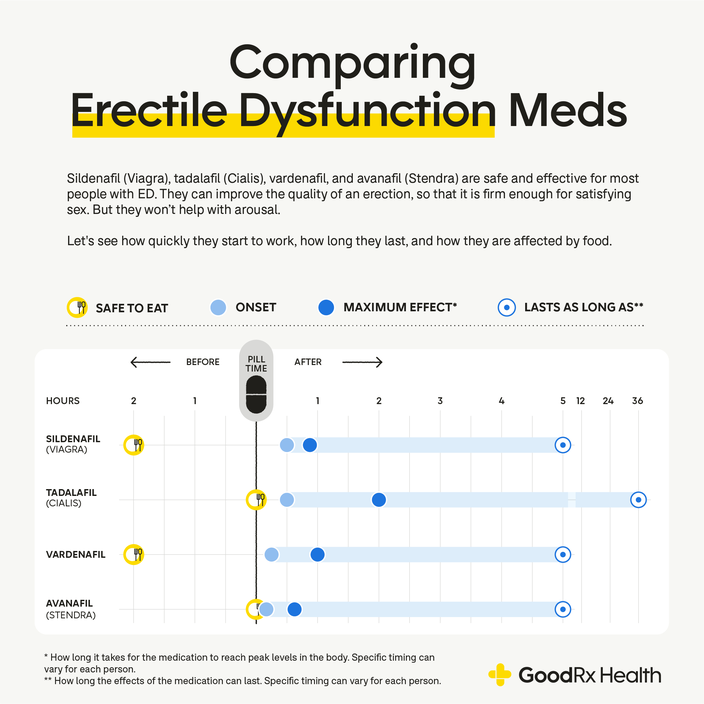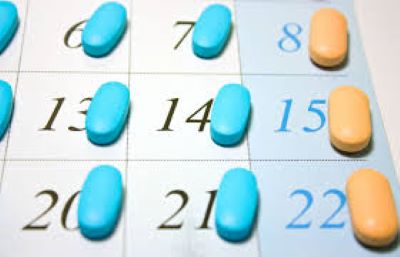Many men turn to oral erectile dysfunction (ED) medications, such as Viagra (sildenafil) and Cialis (tadalafil), for a boost in the bedroom. Injectable ED medications, such as Edex (alprostadil) and Caverject (alprostadil), are also options.
Key takeaways:
- Oral medications like Viagra (sildenafil) are common treatments for erectile dysfunction (ED). Injectables like Caverject (alprostadil) are another option. But injectables are administered directly into the penis.
- Oral ED medications may cause side effects such as headaches, flushing, and stomach upset. Injectable medications tend to cause different side effects. Examples include pain at the injection site, rash, and swelling.
- Rare but serious ED medication side effects are possible too. These include a prolonged and painful erection and sudden vision loss. Both of these issues warrant swift medical attention.
All of these medications do well to support erections. They do so by increasing blood flow to the penis. But they also have important differences. These include how long their effects last, whether they should be taken on an empty stomach, and how often you take them.
Side effects are another factor to consider. Most of them are mild and don’t occur frequently, but serious side effects can happen in rare cases. Knowing how to respond to these situations can help make your experience with ED medications more successful.
ED medication side effects at a glance
Some ED medication side effects are relatively common and mild, including:
- Headaches
- Flushing
- Body aches
- Dizziness
- Vision changes
- Congestion and runny nose
- Stomach upset
- Low blood pressure
- Penile pain (injectables only)
Rare but serious side effects may include:
- Priapism, or erections that last longer than 4 hours
- Sudden hearing changes
- Vision loss
- Deformed penis (injectables only)
- Needle breakage (injectables only)
- Benzyl alcohol toxicity (injectables only)
Let’s review eight ED medication side effects you may experience and how to manage them.
1. Headaches
Oral ED medications are sometimes associated with headache pain. They even have a nickname: Viagra headaches. Headaches can happen because of how the medications work. Oral ED medications can cause blood flow and chemical changes in your brain, which can cause a headache.
Simple measures such as limiting alcohol, getting enough sleep, and prioritizing hydration can go a long way in lessening headache symptoms. If needed, you can also find relief with over-the-counter (OTC) pain relievers.
However, you should speak to a healthcare professional if headaches are bothering you after starting your ED medication. They may consider adjusting your dose or switching you to another medication. For example, switching from Viagra to a low dose of another oral ED medication, such as Cialis or Vardenafil, may lead to headache relief.
Injectable ED medications are unlikely to cause headaches by comparison. Caverject or Edex may be more tolerable.
2. Flushing
You may notice your face turn red and warm as a response to stress, embarrassment, or other social situations. This is called flushing. It can also occur as a side effect of medications, including oral ED medications.
Viagra, Cialis, and vardenafil can all cause flushing. Stendra (avanafil) can too. This happens because these medications make your blood vessels expand, which increases blood flow in your face. While flushing is common, it’s usually not serious enough for people to stop taking the medication. Flushing is usually temporary and mild.
Still, make sure to speak to a healthcare professional if flushing bothers you — especially in social situations where you may feel self-conscious. They can lower your dose or switch you to a different medication that’s less likely to cause flushing, such as Caverject or Edex.
3. Stomach upset

Viagra, Cialis, and other oral ED medications can sometimes cause indigestion or nausea.
Again, a few simple tips can help reduce stomach-related symptoms. For starters, consider taking your medication with a light meal or snack. Avoid fatty and spicy foods, though, as they can make your symptoms worse. Your pharmacist may also recommend taking an antacid if you’re having acid reflux.
If stomach problems are intense or persist, your prescriber may want to lower your oral ED medication dose or switch you to another ED medication entirely.
Keep in mind: If you’re experiencing an upset stomach and choose to take Viagra or vardenafil with a light meal, be aware that they may take longer to start working.
4. Nasal side effects
Oral ED medications may cause temporary issues with nasal congestion, or a stuffy nose. This is related to how they widen your blood vessels. Thankfully, nasal congestion isn’t common overall — even when taking higher medication doses.
Nasal congestion can be uncomfortable when it happens though, particularly when you’re trying to go to sleep. The good news is that you can take proactive steps to feel better. Increasing your water consumption, using saline nasal sprays, and taking steamy showers may help relieve stuffiness.
Speak to a healthcare professional if your congestion is bothersome or doesn’t go away. They may suggest trying another medication or adjusting your ED medication dose. Viagra may cause less nasal congestion than other oral ED medications. This side effect isn’t typically seen with injectable ED medications either.
5. Low blood pressure
Many people live with high blood pressure. But low blood pressure can also be problematic.
Oral and injectable ED medications can sometimes cause a drop in blood pressure. Thankfully, this decrease isn’t dangerous for most people. This risk is more significant if you’re taking certain heart and blood pressure medications at the same time.
You should avoid taking ED medications altogether if you’re taking a nitrate medication for chest pain. Nitrate examples include Monoket (Isosorbide mononitrate) and Nitrostat (nitroglycerin). Alpha blocker medications such as Cardura (doxazosin), terazosin, and Minipress (prazosin) are also risky.
You may not notice any major changes in your blood pressure while taking ED medications. However, speak to a healthcare professional right away if you feel dizzy, lightheaded, or like you’re going to faint. These are all warning signs of low blood pressure.
6. Vision changes
Oral ED medications are sometimes associated with vision changes. This includes a temporary effect on color vision. Some people aren’t able to tell blue and green from each other. Fortunately, these vision changes are less likely with lower doses. They’re generally mild and should go away once your body breaks down (metabolizes) the medication.
These ED medications may rarely cause a more serious eye problem called non-arteritic anterior ischemic optic neuropathy (NAION). This condition may lead to sudden vision loss in one or both eyes. Certain health conditions, such as diabetes, high blood pressure, and heart disease, increase your risk of NAION. NAION can cause permanent vision loss if it’s not treated quickly. Call 911 or go to the nearest ER right away if you lose vision in one or both eyes.
7. Priapism
Priapism is a rare but serious side effect of oral and injectable ED medications. It’s an erection that lasts more than 4 hours. Priapism can be painful and may cause permanent damage to your penis if left untreated. Seek emergency medical attention right away if you experience priapism.
If you experience this side effect, to be safe, your prescriber will likely adjust your dose or suggest a different ED treatment after the situation has resolved.
Good to know: Certain health conditions increase the risk of priapism. These include sickle cell anemia, leukemia, and multiple myeloma, all of which affect blood flow. Taking unapproved or larger doses than prescribed of your ED medication can also increase your risk of priapism.
8. Injection-related complications
Caverject and Edex are forms of alprostadil injected directly into the penis. Occasionally, they can cause injection discomfort. Side effects include pain at the injection site, bruising, and skin rashes. Of these, temporary injection site pain is the most common. These side effects are also possible with alprostadil-containing compounded products such as TriMix and BiMix.
Infection is another risk. The injection process can introduce bacteria into the penis, which can cause skin infections. It’s important to follow strict hygiene practices such as using sterile needles and cleaning the injection area properly to lower this risk. Slightly rotate where you inject the medication to give your skin time to heal, too.
Injectable ED medications can also cause scar tissue to form. This can deform your penis. The needle can also break in your penis during the injection process in rare cases. If this happens, take the broken end of the needle out (if you are able to) and seek medical attention right away.
The bottom line
Oral and injectable erectile dysfunction (ED) medications, such as Viagra (sildenafil) and Caverject (alprostadil), can help people achieve and maintain erections. But they come with potential side effects.
Common oral ED medication side effects include headaches, flushing, and stomach upset. They can often be managed with OTC medications, dosage adjustments, or switching to other medications. Injectable ED medications have their own possible injection-related side effects, such as pain, bruising, and skin rashes. Serious but rare side effects, including priapism and sudden vision loss, require immediate medical attention.
By Mandeep Sohal, PharmD, who has more than 7 years of experience in the pharmaceutical industry and is licensed in California. In his career, he’s had experience with speciality pharmacy, community pharmacy, pharmacy benefit management, and pharmaceutical manufacturers.


